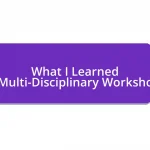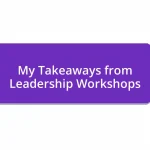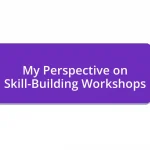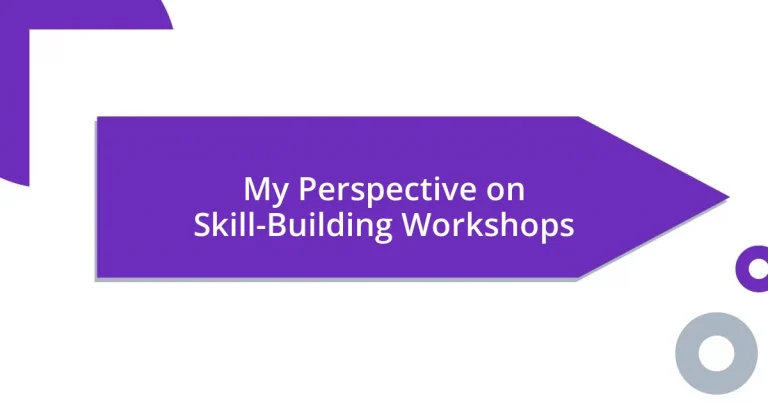Key takeaways:
- Skill-building workshops foster community, networking, and tailored learning experiences that enhance personal growth.
- Engagement and active participation during workshops lead to deeper understanding and lasting knowledge retention.
- Applying learned skills through practice and sharing knowledge with others reinforces understanding and builds confidence.
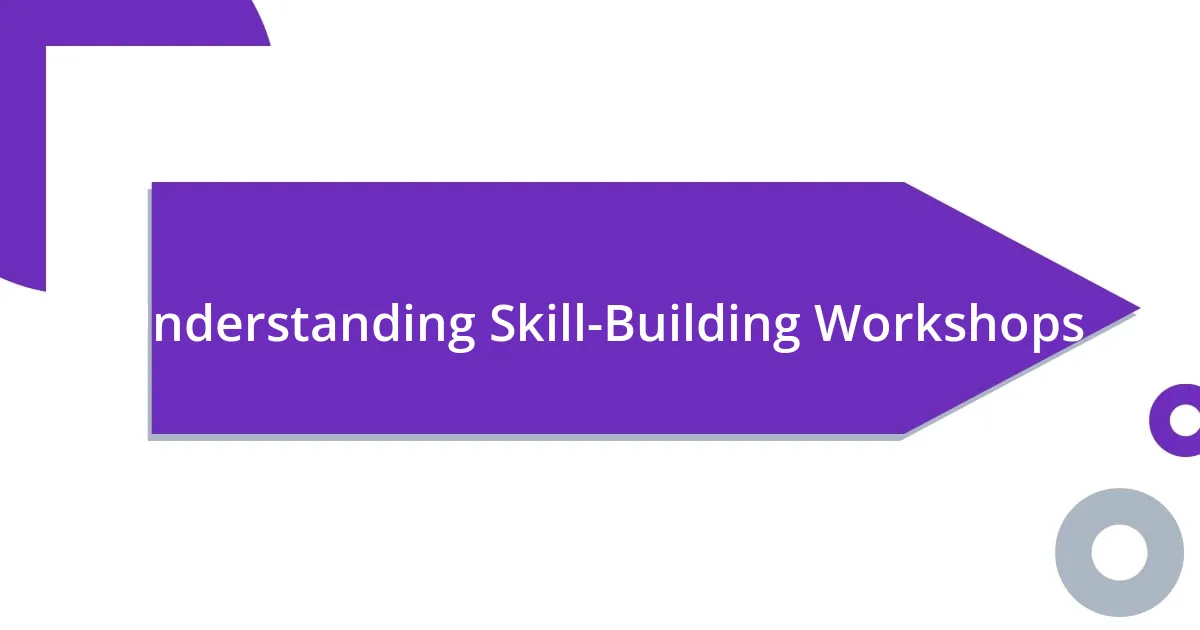
Understanding Skill-Building Workshops
Skill-building workshops are designed to enhance specific skills, whether they be technical, creative, or interpersonal. I remember attending a photography workshop a few years ago, and it was fascinating to see how sharing our experiences fostered a learning community. Isn’t it incredible how we can grow together simply by pooling our perspectives?
These workshops often provide hands-on experiences, which can be invaluable for practical learning. For instance, while learning how to code at a workshop, I realized that the collaborative projects allowed us to tackle challenges that seemed insurmountable alone. Have you ever found yourself solving problems more effectively with others?
Moreover, skill-building workshops often emphasize real-world application. I vividly recall a leadership workshop where we role-played various scenarios; that practice made the concepts stick. Engaging in such dynamic environments not only builds skills but also boosts confidence. Don’t you think that stepping out of our comfort zones is where real growth happens?
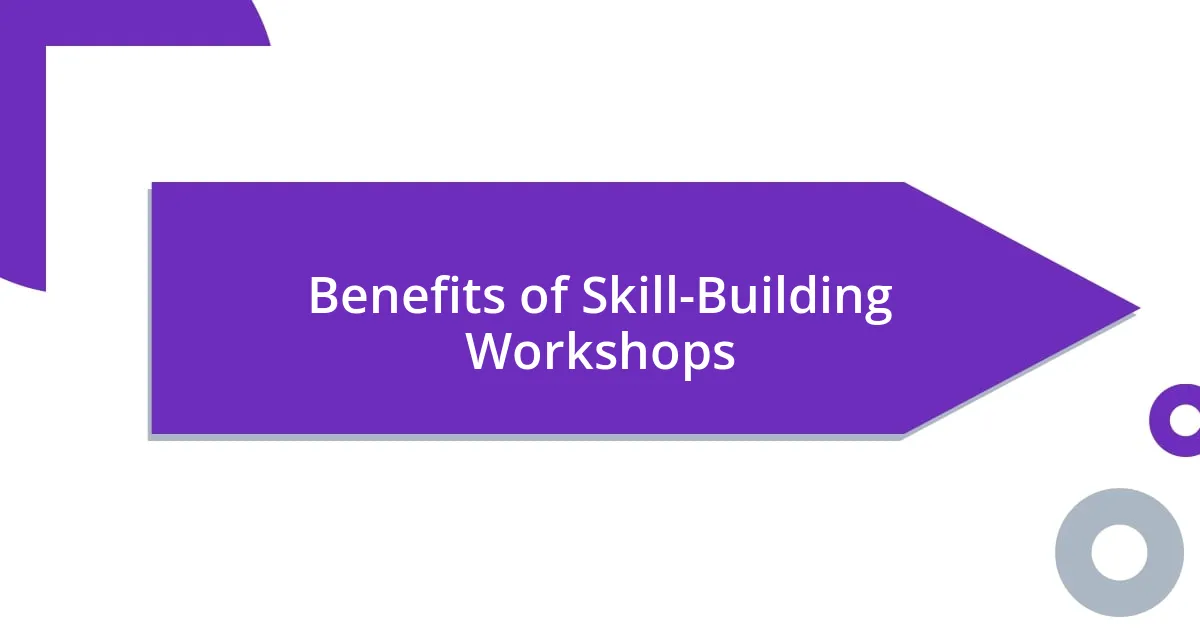
Benefits of Skill-Building Workshops
Skill-building workshops offer a treasure trove of benefits that extend far beyond just acquiring new skills. I still remember the buzz of excitement during a workshop on public speaking. The supportive environment helped me find my voice, and I even made lifelong connections with fellow participants. This sense of community can be one of the most rewarding aspects of these workshops.
Here are some of the key benefits I’ve noticed:
– Networking Opportunities: You meet people who share your interests, fostering connections that can lead to collaboration or mentorship.
– Tailored Learning Experiences: Workshops often adapt to the participants’ needs, ensuring that you get the specific skills you’re looking for.
– Immediate Feedback: The structure allows for real-time guidance from instructors and peers, which can accelerate your learning curve.
– Boosting Confidence: Each successful task completed in a workshop builds self-esteem, making you more capable in your everyday life.
In one workshop focusing on digital marketing, I felt the power of real-time feedback when our group presented strategies. The constructive criticism from experts not only sharpened my skills but also transformed my hesitance into excitement about sharing ideas. This interaction can truly enhance personal and professional growth.
One of the standout benefits is the varied learning styles catered to in workshops. I recall a hands-on cooking class where our instructor paired theory with practice – it was simply delicious! That experience reinforced how learning in different formats can resonate deeply, ensuring that knowledge is not only acquired but truly understood. It’s in these environments where I’ve found my inspirations come alive.
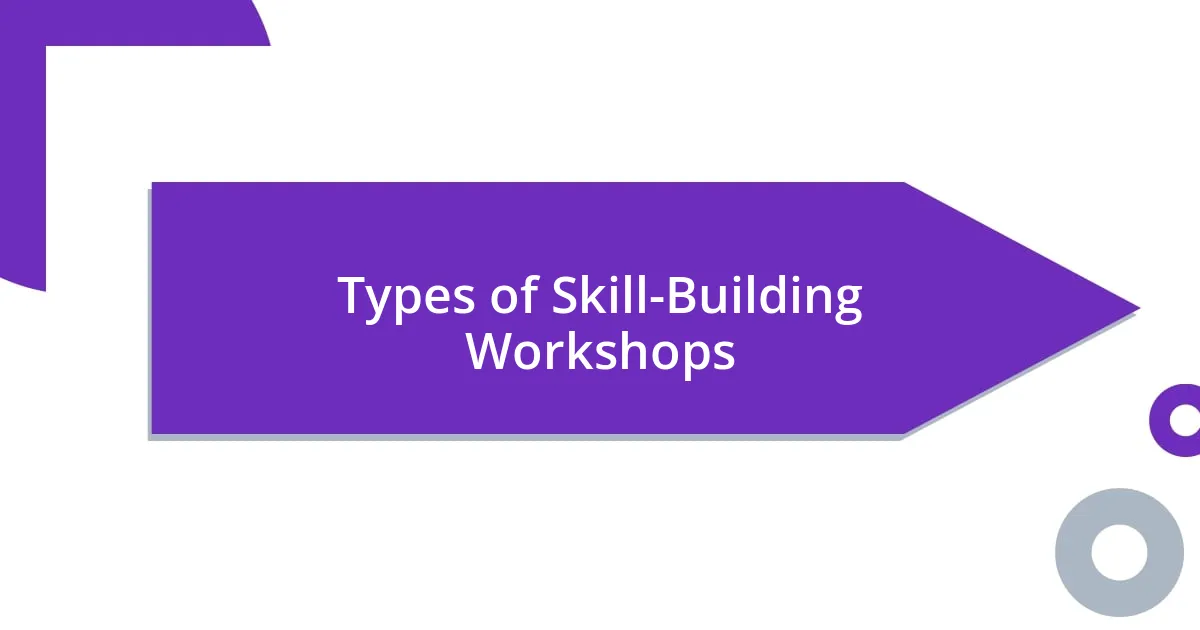
Types of Skill-Building Workshops
Skill-building workshops can be categorized into various types, each targeting specific areas of development. For example, technical workshops focus on specialized skills like coding, digital marketing, or graphic design. I remember a hands-on web development workshop where I marveled at how quickly we built a simple site from scratch. It was exhilarating to see tangible results from our collective efforts.
On the other hand, creative workshops encourage artistic expression and innovation, ranging from writing and painting to photography and music. Participating in a creative writing workshop opened my eyes to different storytelling techniques. The instructor’s praise for my unconventional metaphor left me blushing with pride. Isn’t it amazing how constructive feedback can unleash hidden talents?
Finally, interpersonal workshops aim to enhance skills such as leadership, teamwork, or public speaking. I’ll never forget an interactive session on conflict resolution where we acted out real-life scenarios. The laughter and camaraderie created an environment where everyone felt safe to share. It’s moments like these that not only teach but also bond us, shaping our perspectives in profound ways.
| Type of Workshop | Description |
|---|---|
| Technical | Focuses on specialized skills, like coding and digital marketing, often using hands-on projects. |
| Creative | Encourages artistic expression through mediums such as writing, painting, or music, often fostering innovation. |
| Interpersonal | Enhances soft skills like leadership and teamwork through role-playing and interactive scenarios. |
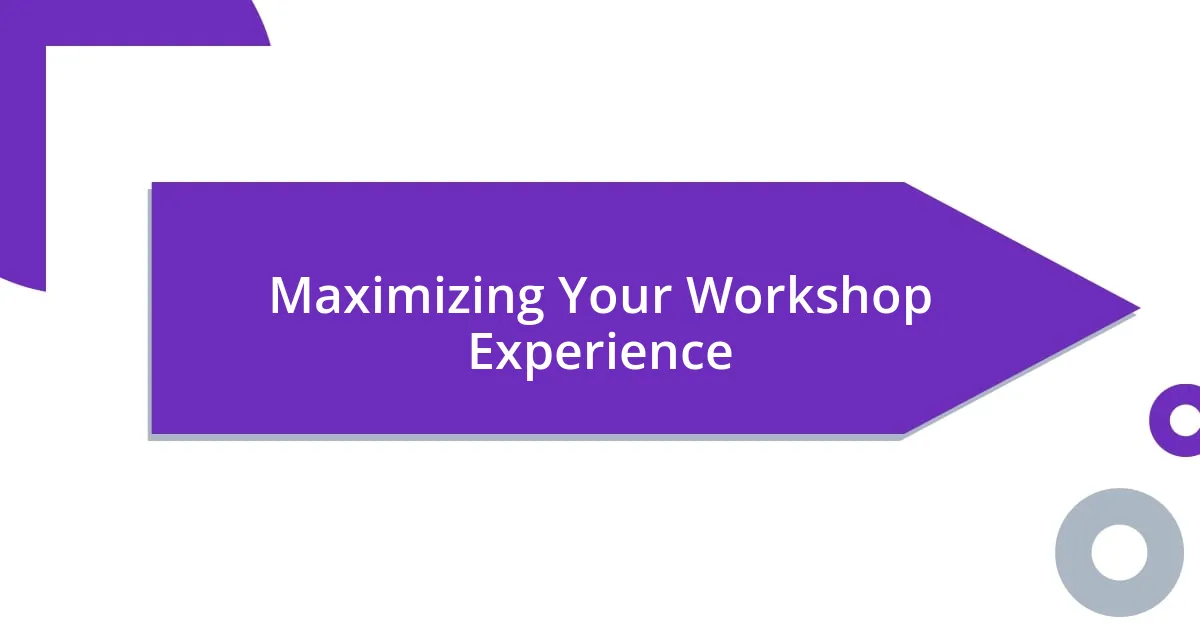
Maximizing Your Workshop Experience
To truly maximize your workshop experience, I find it crucial to approach each session with an open mind and a willingness to engage. There’s something magical about stepping outside your comfort zone, much like the first time I shared my artwork in an art critique group. Embracing vulnerability not only invited feedback but also deepened my connection with other participants. Have you ever felt that rush of exhilaration when you let go of your reservations? It can be invigorating!
I also recommend actively participating and asking questions. In one workshop on leadership skills, I found myself curious about the instructor’s approach to mentoring. When I spoke up, I not only gained clarity but discovered new strategies I hadn’t considered before. Engaging in dialogue not only enriches your understanding but also encourages others to share their experiences – it transforms the entire dynamic of the workshop. Isn’t it interesting how one question can spark a whole new level of conversation?
Finally, take the time to reflect on what you learn after each session. I remember jotting down key takeaways from a writing workshop, and with each note, I felt a wave of inspiration wash over me. It’s in those moments of reflection that we can identify how to implement our new skills in real life. How often do we leave a workshop and let the information slip away? By committing to regular reflection, you ensure that the lessons stick with you long after the workshop ends, turning knowledge into action.
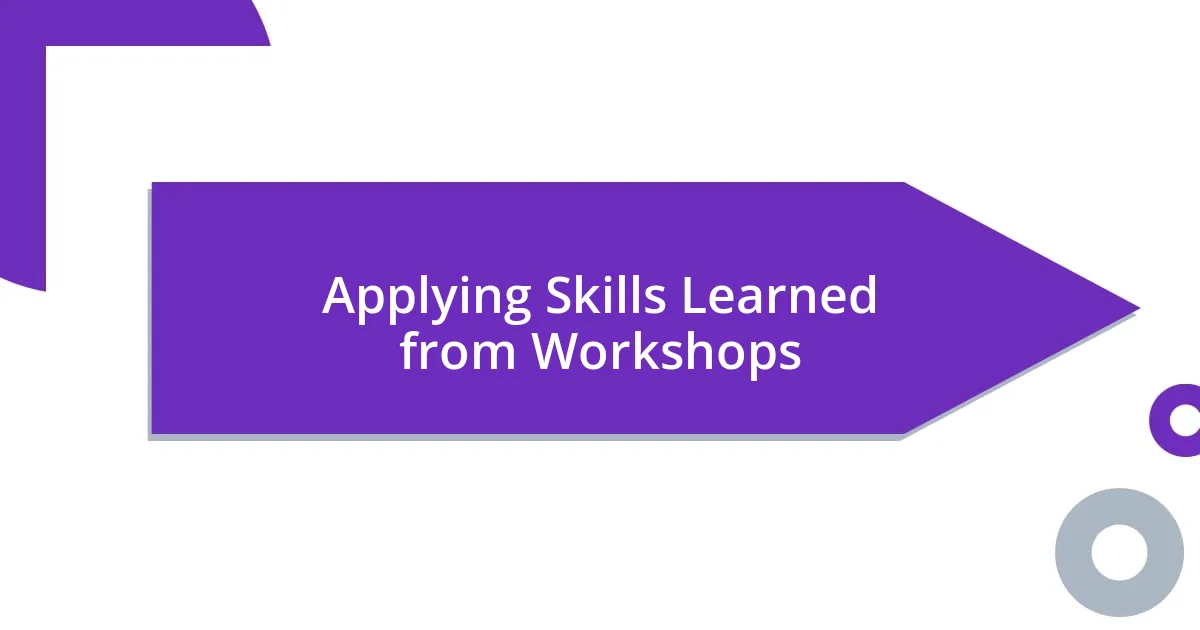
Applying Skills Learned from Workshops
Applying the skills learned from workshops can sometimes feel overwhelming, especially when you’re trying to implement several new techniques at once. After a workshop on digital marketing strategies, I found myself grappling with everything I had absorbed. To manage this, I decided to focus on just one key takeaway each week and gradually integrate it into my daily routine. Taking small steps made the process much less daunting, and soon I noticed real improvements in my online presence. Have you ever tried prioritizing just one skill before? It can be surprisingly effective!
Another effective method is to create opportunities for practice within your community. After attending a public speaking workshop, I sought out local meetups to hone my skills. I recall nervously delivering a short talk at a community event, but the support from the audience was incredibly encouraging. Each opportunity to speak in front of a group bolstered my confidence, reminding me that growth comes from consistent practice. Isn’t it amazing how our local environment can serve as both a platform and a safety net?
I also found that sharing what I’ve learned with others can reinforce my own understanding. Within a few weeks of a leadership workshop, I organized a small group discussion to talk about our experiences and insights. The lively exchanges not only clarified my thoughts but allowed others to benefit from the knowledge I had gained. It struck me how teaching can truly solidify one’s own learning. Have you ever experienced the joy that comes from guiding someone else while also learning anew? It’s one of the most rewarding aspects of skill application.
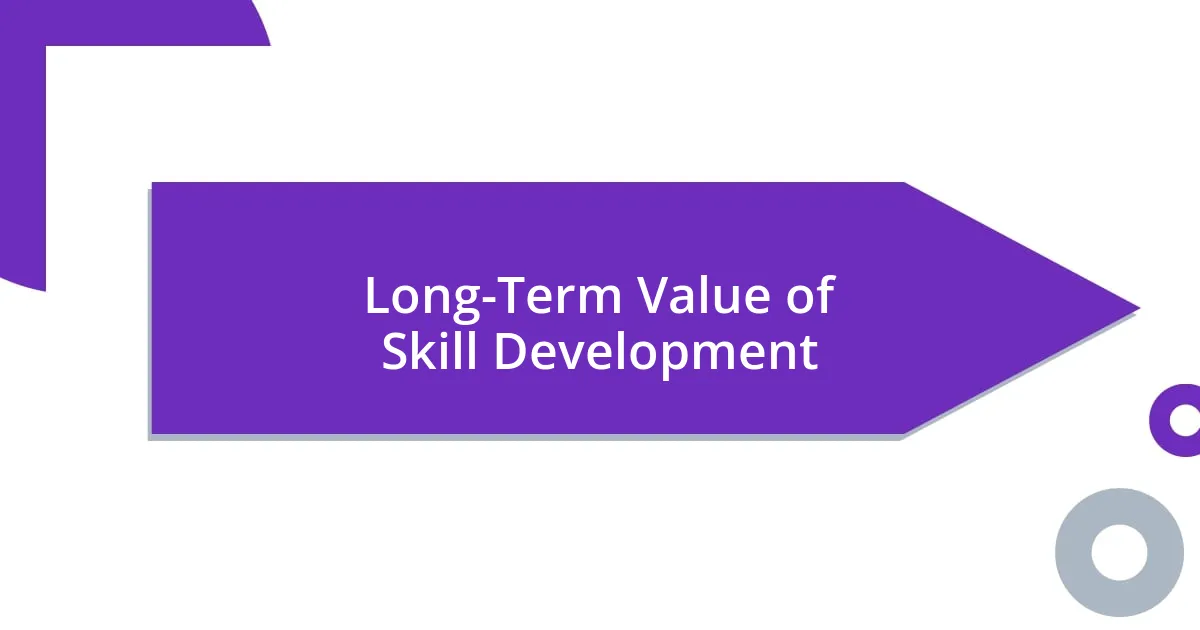
Long-Term Value of Skill Development
The long-term value of skill development really hits home when I reflect on how these skills evolve over time. Take my experience with writing, for instance. Initially, I struggled to express my ideas clearly, but after attending several workshops, those once-distant concepts became second nature. Isn’t it fascinating how persistence, combined with deliberate practice, transforms our abilities into lasting assets?
I remember a moment of clarity during a coding workshop when a complex problem finally clicked. I felt a rush of accomplishment that propelled me to pursue further projects. Now, several years later, those foundational skills have not only boosted my confidence but also opened doors to career opportunities I never imagined. Have you ever experienced that shift where something once challenging becomes a pathway to new prospects?
Moreover, skill development promotes a growth mindset that permeates every aspect of life. I’ve noticed that the confidence I built from mastering new techniques has encouraged me to tackle challenges across various fields, from photography to project management. Just think about it: every new skill you acquire is like adding another tool to your toolbox. Isn’t it exciting to envision how those tools can help you construct the life and career you desire? The ripple effects of investing in skill development are truly profound.
